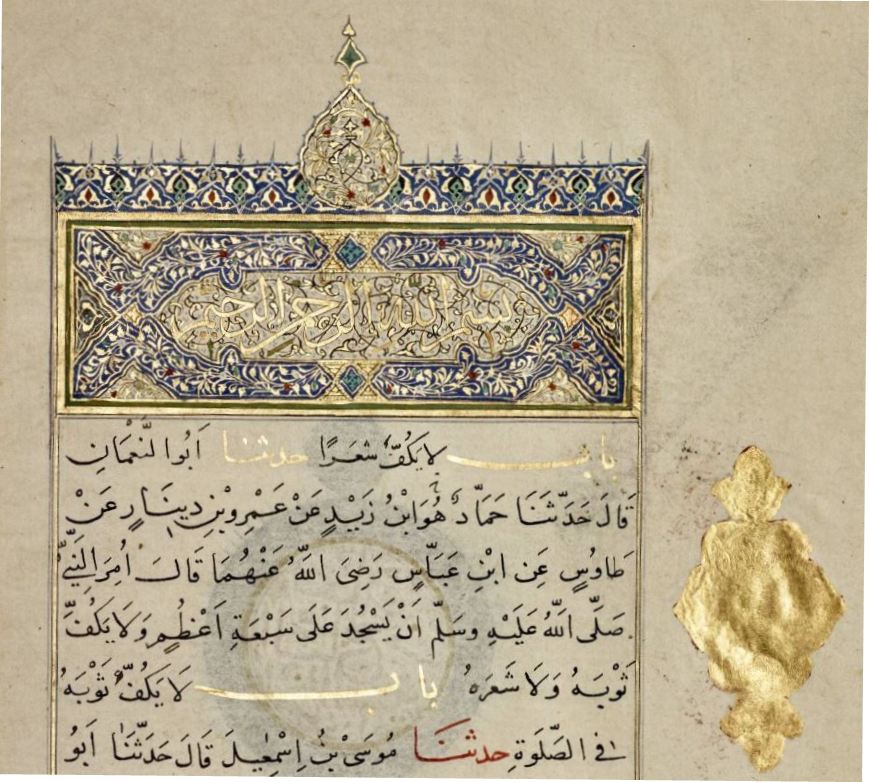
Every attempt to make two contradictory things agree is wasted effort; it amounts to no more than tapping on the shoulder and can only delay perhaps the moment of collision. Is it unreasonable to believe that al-Bukhari and his colleagues were so unfamiliar with the Qur'anic texts that they remained oblivious to the extent to which the texts which they had collected - the hadith - were conflicting with the other hadith and Qur'anic texts?
A PERPLEXING ISSUE indeed. All the criteria for accepting the validity of a hadith focus upon the chain of transmission – that is, the narrators of the hadith – rather than their content. Their watchword in this respect is “the soundness of the justice of a man and his truthful character is an indication of the soundness of the hadith that he narrates!”
A historical comedy or farce in every sense of the word. Imagine one of them offering you some merchandise – salt, for example – and he sells it to you as sugar, or peddles you iron as gold. And instead of verifying the merchandise you ask about the trade or the seller, and if you are told that he is a honest broker, you buy his wares! The sad thing is when you find out the true nature of the goods, nevertheless you purchase them and the greatest disaster is that you are unaware of the truth about them!
There is a huge difference between goods that fool a single person where the damage is limited to him, and hadith goods – a primary constituent of an entire culture – which have taken in millions of people over centuries of time who remain besotted by this trick, whilst at the same time we continue to extol in gratitude morning and evening the very trader who sold us the goods and who is now a pile of crumbling bones.
Focus has been upon the chain of their transmission – rather than their content
Is it reasonable to believe that al-Bukhārī and his colleagues were so unfamiliar with the Qur’anic texts that they remained oblivious to the extent to which the texts which they had collected – the hadith – were conflicting with other hadith and Qur’anic texts?
Because this is certainly not reasonable, we are clearly left all the more perplexed at this greatest religious scam in Islamic history. Our confusion is all the greater when we realise that al-Bukhārī (Abū ʽAbd Allāh Muhammad ibn Ismāʽīl, 809-867 AD) collected together 70,000 hadith – others say that he collected 200,000 hadith – but he considered no more than 2,726 hadith not to be repetitions of others, and 7,397 to have complete chains of transmission, including repeated hadith.[1] That is, he undertook a screening process for the hadith and rejected the major part of them. So on what basis did he undertake this screening process? On the basis purely of the soundness of the chain of transmission. That is, he never accorded any importance to the matter of content!
Despite this intensive screening process some faqihs and scholars had issues with the drawbacks of al-Bukhārī’s Sahīh. Hadith memorisers criticised 110 hadith, 32 of which were in agreement with the collection by Muslim and 78 of which are self-standing. As they said, some of those he narrated were not reliable, while some of them “were acceptable in terms of their message but not in terms of their expression” (that is, that they were semi-silly).[2]
They employ all manner of fraud, deception, trickery, cunning and slyness
A contradiction indeed! ‘But who says that there is a conflict or a contradiction between the hadith and the Qur’ān?’ Such is the response of those who defend the hadith; they affirm that the contradiction is illusory and in order to buttress their claims they engage in another process of interpretive scamming through wringing the necks of the texts and inappropriately employing all manner of fraud, deception, trickery, cunning and slyness. You find them at various times resorting to philosophy, logic, science, declamation, poetry, rhetoric, legerdemain and charlatanry, and anything made available to them, to gain the approval of the believing public.
Operations undertaken by these people to harmonise the Qur’anic text with the hadith are yet another form of scamming process the Islamic nation has fallen victim to – willingly, happily and entirely taken in. None of the calls for the necessity of purging the hadith and comparing them with the Qur’ān and rejecting any that conflict with it, is of any use.
Examples of conflict between the hadith and the Qur’ān
- Cases of clear conflict in ruling
The question of whether a hadith may abrogate the Qur’anic text is a one shrouded in mystery. There are some who claim that the hadith cannot abrogate the Qur’ān, while others hold that mutawātir[3] hadith may indeed abrogate the Qur’ān. Whatever the view, all are agreed that a mutawātir hadithor a non-mutawātir hadith(that is, an āhād hadith[4]), can abrogate the rulings of the Qur’ān whenever many of such hadith can be amassed together. Muhammad Salīm al-ʽAwā notes the following:
One should not cite as evidence for the propriety of abrogating the Almighty’s words: Let there be no compulsion in religion the existence of sound Prophetic hadith that refer to the killing of an apostate, given that it is established in usūl al-fiqh[5] that only a Qur’ānic text can abrogate another Qur’ānic text.[6]
That is, al-‘Awā does not agree with the killing of an apostate, but he defends such hadith – which he terms ‘sound’ – when these call for the killing of an apostate!
How can a hadith be ‘sound’ and yet be contradictory to the Qur’ān at one and the same time?
How can we make sense of this? How can a hadith be ‘sound’ and yet be contradictory to the Qur’ān at one and the same time? Yet, again, if this hadith is sound it consequently can indeed abrogate a Qur’anic ruling, as al-ʽAwā states above! All this ducking and diving is carried out simply in order to preserve this lame contradiction. It is a lame contradiction because they do not recognise its existence, that is, they are blind both in vision and insight. Keep in mind that al-‘Awā is considered to be a member of the moderate al-Wasat trend of Islamic thought, and that in his above opinion he is opposing the standpoint taken by his shaykh al-Qaradawi, who in fact maintains the necessity of applying the ruling on apostasy to secular thinkers.
Example: the punishment for adultery
The ruling of the Qur’ān: flogging, with no distinction made between the married or unmarried woman, or the married man or bachelor:
The adulterer and the adulteress, scourge ye each one of them (with) a hundred stripes. And let not pity for the twain withhold you from obedience to Allah, if ye believe in Allah and the Last Day. And let a party of believers witness their punishment. [Qur’ān XXIV,2]
The ruling of the hadith: Flogging for the non-married woman and stoning to death for the married woman:
‘Ubāda ibn al-Sāmit relates that the Prophet said: Take this from me, God hath appointed a way for women – in the case of the virgin with a virgin: the penalty is 100 lashes and banishment for a year; in the case the non-virgin with the non-virgin: flogging and stoning [Muslim and Abū Dā’ūd].
Not contented with just this ruling of the hadith, some sought to support it with a Qur’ānic verse. Since there was no such verse to be found, they were left with having to invent one:
If an adult male and female commit adultery then surely ye must stone them outright as an exemplary punishment from God!
Their argument was that the recitation of the Qur’anic verse had indeed been abrogated but the force of its ruling had not!
Example: The punishment for apostasy
The ruling of the Qur’ān: There is no worldly penalty or punishment for the apostate according to the content of the verses of the Qur’ān.
And they will not cease from fighting against you till they have made you renegades from your religion, if they can. And whoso becometh a renegade and dieth in his disbelief: such are they whose works have fallen both in the world and the Hereafter. Such are rightful owners of the Fire: they will abide therein. [Qur’ān II,217]
O ye who believe! Whoso of you becometh a renegade from his religion, (know that in his stead) Allah will bring a people whom He loveth and who love Him, humble toward believers, stern toward disbelievers, striving in the way of Allah, and fearing not the blame of any blamer. Such is the grace of Allah which He giveth unto whom He will. Allah is All-Embracing, All-Knowing. [Qur’ān V,54]
Lo! those who believe, then disbelieve and then (again) believe, then disbelieve, and then increase in disbelief, Allah will never pardon them, nor will He guide them unto a way. [Qur’ān IV,137]

Suggested Reading
The ruling of the hadith: ‘The one who changes his religion – kill him.’ This is the prevalent ruling, while in the hadith and the sīra (biography) of the Prophet there are passages that go against this ruling. The community apostatised after the death of the Prophet, but the Prophet when alive had referred to a group who would counteract the apostasy saying: “They are the people for this, and pointed to Abū Mūsā al-Ashʽarī”(from a hadith narrated by al-Hākim in his Sahīh). Even though the verdict of death is not in accordance with what had been established concerning the freedom of religious belief and the absence of any compulsion to remain in a religion in which one no longer believes. Nevertheless they machinate, as is their wont, against the Qur’ānic ruling by saying:
The putting to death of the apostate is not a punishment against thought itself or against the quitting of the Islamic faith. Rather, it is a punishment against high treason and religious intrigue perpetrated by the apostate when he falsely and slanderously declared his adoption of Islam, only to announce his renunciation of it with the intention of abusing it and challenging it.[7]
[1] M.S al-‘Ashmāwī, The Truth concerning the Hijāb and the use of the Hadith as a Pretext. The above examples are merely the tip of the iceberg when it comes to the errors in the hadith. For more details see the works such as Yahyā Muhammad, The Problem of the Hadith and Ibrāhīm Fawzī, The Recording of the Sunna.
[2] M.S. al-Ashmawi, ibid.
[3] A hadith of which the narrators constitute a group or large number, on the understanding that it is considered impossible for them all to agree to transmit a lie. (Ed.)
[4] A hadith where there is only a single narrator for it, or a single, geographically isolated group of narrators for it, thus disqualifying it from being considered mutawātir (Ed.)
[5] The ‘science of legislative principles’, See Glossary: usūl al-fiqh
[6] Dr. Muhammad Salīm al-ʽAwā, his article ‘The Ruling on Apostasy is a punishment, not a penalty’, Islamonline.
[7] The Ruling on the Apostate: The Islamic Encyclopaedia.
Main picture: The ḥadīth as scripture: a muṣḥaf-like page from the Ṣaḥīḥ al-Bukhārī with gold illumination. The passages calligraphically inscribed are Ḥadīths 815 and 816 from chapter كتاب الأذان : “The Prophet was ordered to prostrate on seven bony parts and not to tuck up his clothes or hair” (when performing ṣalāh). Unknown artist, Shiraz, dated 1400-1450. From the Keir Collection of Islamic Art, Object number K.1.2014.800.1.


